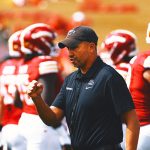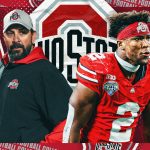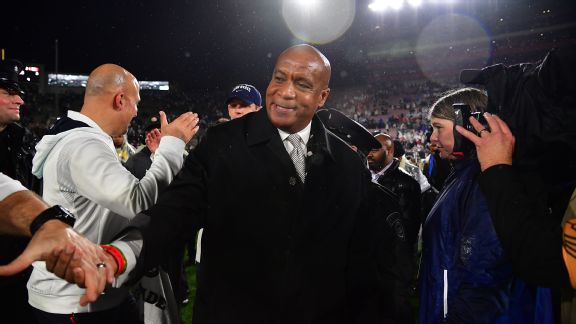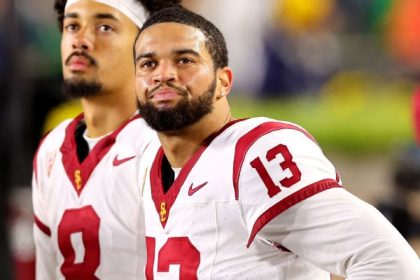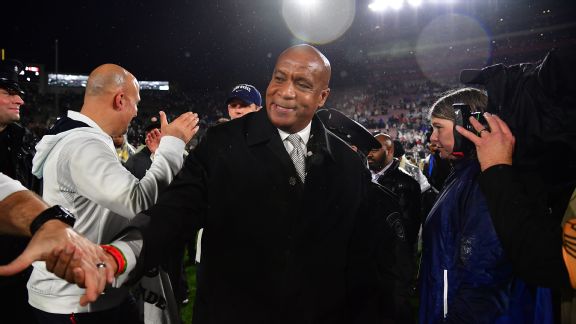
LAKE FOREST, Ill. — As the Chicago Bears begin a year that could redefine one of the NFL’s charter franchises, their first move was changing their approach to filling a key position.
By hiring former Big Ten commissioner Kevin Warren as the team president and CEO, the Bears strayed from their standard operating procedure of promoting from within. Warren replaces Ted Phillips, who is retiring after 40 seasons with the organization, including the last 24 as president and CEO.
Warren, who will be introduced at a news conference Tuesday, is different. He boasts 21 years of experience at the highest levels of the NFL in executive roles with the St. Louis Rams, Detroit Lions and Minnesota Vikings.
As the Vikings’ chief operating officer, Warren was instrumental in the conceptualization and development of U.S. Bank Stadium, as well as a state-of-the-art practice facility and team headquarters — Twin Cities Orthopedics Performance Center (TCOPC). While commissioner of the Big Ten, Warren expanded the conference with the additions of USC and UCLA and negotiated a seven-year media rights deal worth more than $7 billion.
Warren arrives at a crucial time for the Bears, who are in the process of closing on a 326-acre property in Arlington Heights. The Bears also have the most salary cap space of any NFL team ahead of free agency, the No. 1 overall draft pick, and a quarterback in Justin Fields who may finally end the team’s embarrassing drought of not having a franchise-caliber player at the most important position.
What kind of difference will Warren make? Will he modernize a franchise that is viewed by many as behind the times? What will his role be in football operations? Here’s what we know.
What is the significance of Warren being the Bears’ first team president and CEO hired from outside of the organization?
There were only three team presidents before Phillips, who worked his way up from controller after being hired in 1983, and they all had ties to founder George Halas. The fact that Warren is the first person hired from outside the organization to hold this role, and the first Black president and CEO in the team’s 103-year history, is huge.
“He’s a progressive visionary,” one league source said. “He’s not afraid to shake s— up. And I think he’ll [make] them current.”
Five of the eight members on the Bears’ board of directors, which Phillips was a part of, share the last name McCaskey, the family that owns the team. Warren’s fresh perspective on organizational issues for a team that has had the same voices making decisions for decades will be pivotal for invoking change.
“He brought things to the table that would make you think and realize there are other ways to do things,” University of Minnesota athletic director Mark Coyle said. “He sees the big picture. He can make these multibillion-dollar decisions, but at the end of the day, his focus is on relationships. That’s why I think he’s so successful.”
What are Warren’s main responsibilities?
According to a release from the Bears, Warren will oversee general manager Ryan Poles and all business operations of the club. The most pressing issue that awaits Warren when he starts official team business in April is guiding the Bears in their construction of a new stadium.
What role will he play in ushering the Bears out of Chicago?
As Minnesota’s COO, Warren oversaw all business, financial, legal and operational aspects related to the construction of U.S. Bank Stadium, the Vikings’ $1.061 billion stadium that holds a capacity of 73,000.
Hiring Warren to do the same for the Bears is a franchise-altering move. The team aims to close on the land at Arlington Park, which is 33 miles northwest of Soldier Field, during the first quarter of 2023 and move forward with their plan to build a new stadium.
“That whole period helped us transform the identity of the Vikings,” Vikings owner and president Mark Wilf told ESPN. “U.S. Bank Stadium and TCO Performance Center are prime examples of things that have really elevated the fan experience.
“All the efforts [Warren] made there were extraordinary, whether it was negotiating with public officials or the league or helping coordinate our efforts in development, getting it approved, getting it built, he was a part of all our efforts along the way, including when we purchased the team (in 2005).”
Last fall, Bears chairman George McCaskey said the entire project of moving to Arlington Heights, which in addition to a domed stadium will include a multi-purpose entertainment, commercial, retail and housing district, could take more than 10 years to complete.
Under Warren’s leadership, the Vikings broke ground on the Minneapolis stadium in Dec. 2013 and opened their doors ahead of the 2016 season. The Vikings hosted Super Bowl LII one year later.
What was his impact in the Big Ten?
Coyle, the Minnesota athletic director, remembers daily 7 a.m. Zoom meetings Warren held with Big Ten ADs for nearly 100 consecutive days in 2020 as the conference navigated the COVID-19 pandemic. There was an initial decision to cancel the football season, and then a pivot to moving forward with games.
Warren caught heat after deciding to cancel the season. But he proved flexible by remaining available to everyone from the 14 member institutions he oversaw.
“He was very visible with our presidents, visible with our ADs and very visible with student-athletes,” Coyle said. “His visibility and his ability to listen and collectively get us going in the same direction are strengths for him, I think that’s going to be a huge impact on the Bears organization.”
Interestingly, it was Fields, then an Ohio State quarterback, who led a player petition seeking to reverse the decision to cancel the season.
Warren’s business prowess was displayed last summer when he expanded the conference and executed a first-of-its-kind media rights agreement with Fox, CBS and NBC as well as games broadcasted on direct-to-consumer streaming services.
“I just can’t believe how he pulled that off,” said Morton Schapiro, the former chairman of the Big Ten council of presidents and chancellors. “Kevin was thinking a step ahead of everyone. It was 100 percent his idea, unless there were some ADs that were talking to him. But on behalf of the person that in theory he reported to – me – I’ve gotta tell you it was him 100 percent. He kept me informed, he asked for some advice, but it was all him. He’s just brilliant.”
As far as Warren overseeing GM Ryan Poles, does he have experience doing this?
No, but this isn’t his first time interacting with GMs.
When Poles was hired, the first-time general manager reported directly to McCaskey. Prior to his hire, general managers reported to Phillips.
The Bears are going back to their original structure with Poles set to report to Warren.
While he did not have direct responsibilities over football operations in Detroit and Minnesota, Warren started his career in football operations in St. Louis when former Rams coach Dick Vermeil hired him as the VP of player programs and football legal council before promoting him to VP of football administration.
“He has that experience of how football operations are run,” said Steve LaCroix, the former Vikings executive vice president and chief marketing officer. “Every organization is different as far as its culture and how they execute the football operations, but I think he brings a great perspective coming from three different NFL franchises to then come into Chicago and be part of such a storied franchise.”
Warren is also a former college athlete, player agent and has worked with professional and college athletes throughout his career.
“He’s had a lot of close dialogue with GMs, head coaches and been part of searches with us along the way as well,” Wilf said. “All those experiences point well to his football and athletics experience.”
How will he bring stability to an organization with little playoff success and a revolving door at GM and head coach?
The Bears have not won a playoff game since the divisional round in 2010. The team has had four head coaches and four general managers since.
Make no mistake, Warren was not hired simply to help the Bears build a new stadium. He’s here to orchestrate a major cultural shift within the organization and provide stability, something he helped the Vikings achieve over two decades.
“He thinks big,” Wilf said. “He’s a visionary, and I think the Bears will really benefit from that. And along the way, he genuinely cares about people. He’s a great leader.”

